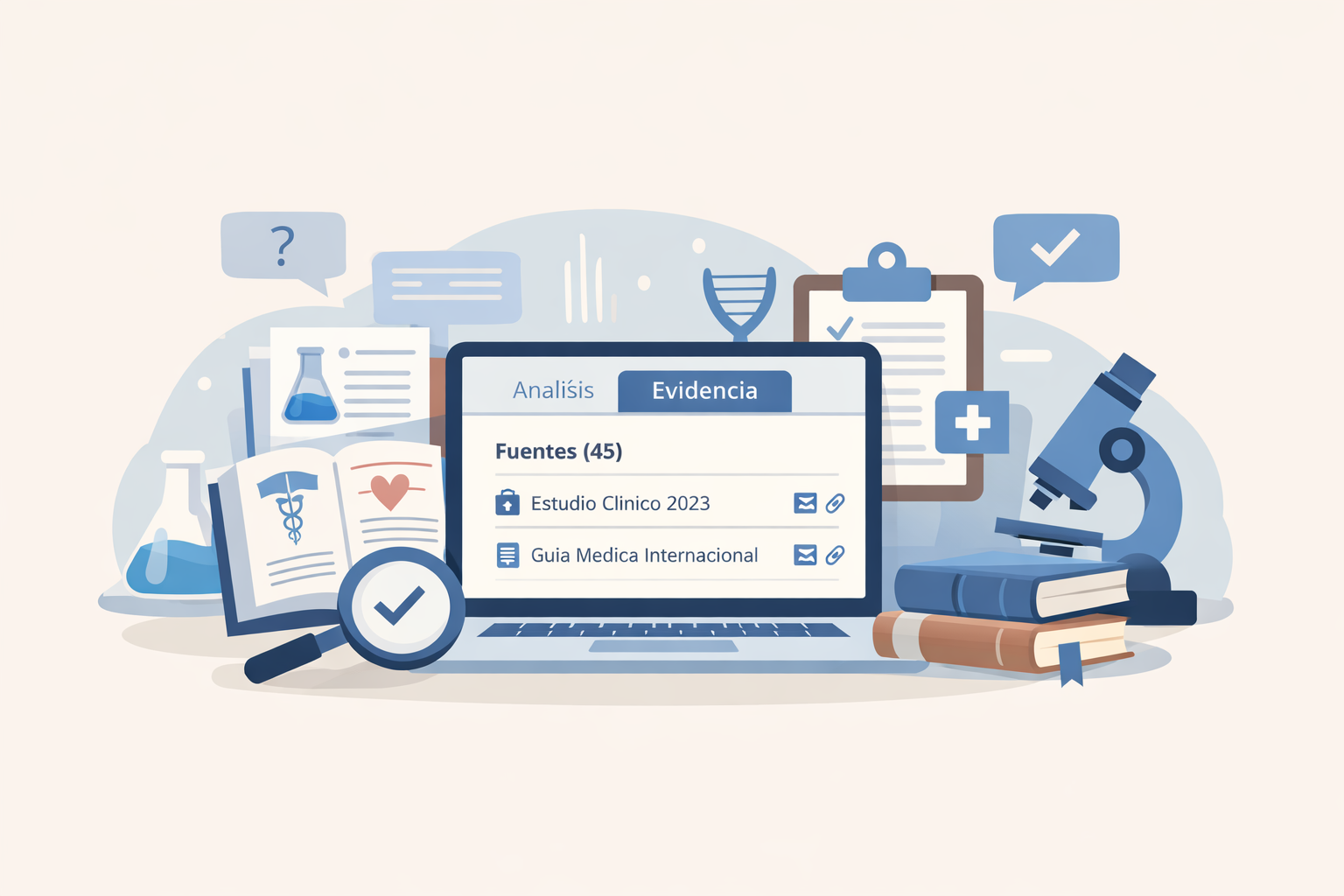More than 70% of private practices in Mexico are already exploring digital solutions to improve medical care. Artificial Intelligence not only accelerates diagnoses, it also facilitates patient management and the processing of sensitive data. Understanding how these tools are transforming the medical practice is key to take advantage of their benefits without losing sight of the privacy and human judgment that each patient deserves.
Key Points
| Point | Details |
|---|---|
| Transformation of clinical practice | AI in medicine does not replace professionals, but helps them process complex information more efficiently. |
| Significant benefits | It accelerates disease detection and personalizes treatments, thus improving the quality of patient care. |
| Data privacy regulation | It is crucial to ensure the privacy of patient data through informed consent and information security. |
| Implementation challenges | There are risks such as algorithmic biases and technology dependency, which require continuous training and human supervision. |
Table of Contents
- Definition and key concepts of medical ia
- Main uses of ia in private practices
- Types of ia tools adopted in mexico
- Data privacy and legal framework in healthcare
- Technological challenges, risks and best practices
Definition and key concepts of medical AI
The Artificial Intelligence (AI) in medicine represents a technological revolution that transforms traditional clinical practice, enabling healthcare professionals to process complex information more quickly and accurately. At its core, medical AI uses advanced algorithms and machine learning models to analyze healthcare data, support diagnoses and optimize care processes.
The fundamental concepts of medical AI include:
- Automatic learningCapacity of systems to improve their performance without explicit programming.
- Natural language processing: Comprehension and generation of human-like medical text
- Predictive analyticsPrediction of risks and possible disease progression
- Pattern recognitionIdentification of subtle features in medical images and clinical data
In modern medical practice, AI acts as a powerful assistant that complements the practitioner's skills, not as a replacement. Its main goal is to reduce the administrative burden, increase diagnostic accuracy and allow physicians to focus more on direct contact with patients. Exploring Artificial Intelligence in Medicine: Transforming Tomorrow's Healthcare offers a deeper insight into these technological innovations.
The benefits of AI in medicine are manifold: it accelerates the early detection of diseases, personalizes treatments based on individual data, and enables more informed and efficient decision making. However, it is essential to remember that technology will always be subordinate to the clinical judgment and human expertise of the healthcare professional.
Main uses of AI in private practices
The Artificial Intelligence is radically transforming the operation of private practices, offering technology solutions that significantly optimize administrative processes and patient care. According to recent research, medical practices can leverage AI to automate repetitive tasks and improve overall practice efficiency.
The main uses of AI in private practices include:

- Appointment managementAutomatic scheduling and smart reminders
- Documentation generationQuick creation of medical records and prescriptions
- Communication with patientsVirtual assistants for basic consultations 24/7
- Data analysisHealth risk prediction and pattern identification
According to specialized studies, 3 new functions to optimize patient consultations demonstrate how technology can reduce administrative burden. AI-based virtual assistants enable practices to offer continuous care, instantly schedule appointments and provide preliminary medical information, substantially improving the patient experience.
Moreover, AI does not replace the medical professional, but acts as a powerful ally that frees up time for more personalized and human contact with patients. By automating routine tasks, physicians can focus on critical aspects of diagnosis and treatment, ensuring more comprehensive and higher quality care.
Types of AI tools adopted in Mexico
The adoption of Artificial Intelligence tools in Mexican medical practices is experiencing exponential growth, with technological solutions that fundamentally transform clinical practice. These tools range from sophisticated diagnostic systems to comprehensive medical information management platforms, enabling healthcare professionals to significantly optimize their work.
The main types of AI tools in Mexican practices include:
The following is a comparison of the main types of AI tools adopted in Mexican medical practices:

| Tool Type | Main Function | Key Benefit |
|---|---|---|
| Assisted diagnosis | Image analysis Interpretation of results | More accurate detection |
| Documentation Assistants | Automatic story generation Creation of medical notes | Saving administrative time |
| Patient management | Appointment scheduling Personalized follow-up | Better organization and service |
| Risk prediction | Evaluation of probabilities of medical conditions | Preventive intervention |
- Assisted diagnostic systemsMedical image analysis and interpretation of results
- Clinical documentation assistantsAutomatic generation of medical histories and medical notes.
- Patient management platformsAppointment scheduling and personalized follow-up
- Risk prediction toolsEvaluation of probabilities of medical conditions
For professionals looking to deepen their knowledge of these technologies, Understanding Differential Diagnosis: A Complete Guide for Health Professionals provides detailed information on how AI can improve diagnostic processes.
The technology landscape in Mexico shows a growing trend towards digitization, with AI tools not only improving efficiency, but also enabling more accurate and personalized medical care.
Practices that adopt these technologies are positioning themselves at the forefront of healthcare innovation, transforming the traditional way of delivering care.
Data privacy and legal framework in healthcare
The medical data privacy represents one of the most critical challenges in the implementation of Artificial Intelligence tools in Mexican practices. With rapid technological advancement, healthcare professionals must navigate a complex legal landscape that protects sensitive patient information while leveraging technological innovations.
Fundamental principles for ensuring privacy include:
- Informed consentObtain explicit authorization from patients
- Data anonymization: Removing personally identifiable information
- Information securityImplement strong encryption protocols.
- TransparencyCommunicating clearly the use of AI technologies
According to the World Medical Association, it is critical to ensure the privacy of patient data when implementing AI systems in healthcare. Answers for physicians with sources and references offers additional resources for understanding these complex legal requirements.
The Mexican legal framework, based on the Ley Federal de Protección de Datos Personales en Posesión de Particulares, establishes strict regulations for the handling of medical information. Practices must develop rigorous internal policies, implement secure data management systems, and maintain an ongoing commitment to the protection of patients' personal information.
Technological challenges, risks and best practices
The implementation of Artificial Intelligence in medical practices represents a path full of opportunities and complex challenges. Healthcare professionals must carefully navigate a technological landscape that demands balancing innovation with safety, efficiency with human precision, and automation with personal contact.
The main technological risks and challenges include:
- Algorithmic biasesPossible distortions in automated diagnostics
- Technological dependenceRisk of over-reliance on automated tools
- Constant updating: Need for ongoing training
- Technological investment: System implementation and maintenance costs
Guides Archives de Itaca offers resources for understanding how to mitigate these risks and take advantage of technology in a responsible manner.
Best technological practices involve a comprehensive approach: implementing systems with constant human oversight, maintaining a critical attitude towards technological recommendations, investing in ongoing training and developing clear integration protocols that preserve medical judgment as a central element of care.
Optimize your practice with reliable AI designed for Mexico
Are you concerned about administrative burden, diagnostic accuracy and the protection of your patient data? We know these are real concerns for private practices in Mexico in the face of artificial intelligence adoption. The pressure of managing appointments, clinical documentation, legal risks and security can distract you from what's most important: providing quality care to your patients. Discover how specialized tools can transform these challenges into real and safe opportunities by reviewing resources at Guides Archives - Itaca.

Don't let fear of technological complexity or data insecurity limit your practice's growth. Take the next step and access solutions built for doctors like you at Itaca.ai. Start experiencing instant clinical note generation, diagnostic support and efficient administration under the highest standards of confidentiality. Ready to achieve more with less effort? Explore the advantages and new features in New Features Archives - Itaca and be at the forefront of medical innovation in Mexico today.
FAQ
What is artificial intelligence in medicine?
Artificial intelligence in medicine refers to the application of algorithms and machine learning models to analyze healthcare data, support diagnoses and optimize care processes, improving clinical practice.
What are the main uses of AI in private practices?
The main uses of AI in private practices include appointment management, documentation generation, communication with patients through virtual assistants, and data analysis to identify patterns and health risks.
How does AI affect the privacy of medical data?
The implementation of AI in medicine requires data privacy safeguards, such as obtaining informed consent, anonymizing information, implementing security protocols, and maintaining transparency about the use of technologies.
What are the challenges of implementing AI in medical practices?
Challenges include algorithmic biases in diagnostics, over-reliance on technology, need for constant training, and system investment and maintenance costs.





Leave a Reply